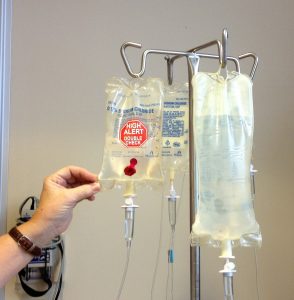
By Christine Kukka
Drugs that suppress your immune system in order to treat cancers, rheumatoid arthritis, psoriasis, COPD and asthma can cause a life-threatening reactivation of your hepatitis B.
This dangerous viral rebound can occur if you are currently infected or even if you cleared the infection and now test negative for the hepatitis B surface antigen (HBsAg) and positive for the surface antibody (HBsAb).
These drugs weaken the immune system, which allows your infection to rebound with a vengeance, spiking your viral load and causing life-threatening liver damage within weeks of starting chemotherapy or high-dose steroids.
What’s behind this reactivation risk? Think herpes or chicken pox (shingles). You might get rid of the infections and the ugly blisters, but small amounts of virus remain and as we age and our immune systems weaken, they can reappear.
The hepatitis B virus (HBV) behaves similarly. When we lose HBsAg and/or develop surface antibodies, there are still small amounts of HBV lurking in our bodies. When we’re healthy, our immune systems effectively contain these trace amounts of virus, but old age, another serious medical condition or immune-suppressing drugs allow hepatitis B to reactivate.
Today, medical guidelines require doctors to test everyone they plan to treat with any immune-suppressing drugs for the hepatitis B core antibody (HBcAb) so they know who has been infected with hepatitis B. If a patient tests positive, doctors must run more tests to determine what risk the new drug will pose. When a patient is at risk of reactivation, doctors will simultaneously treat them with antivirals (either tenofovir or entecavir) and continue antiviral treatment for six more months after the immune-suppressing therapy ends to prevent reactivation.

This mandatory testing is important because some people don’t know they should tell their doctors about their past infection, and many don’t know they’re infected. Here is what happened to one person who contacted the Hepatitis B Foundation after her doctor failed to test her for hepatitis B:
“I recently had my first dose of chemotherapy and I did not mention (to) my oncologist that I was a carrier of hepatitis B, (because) I knew that it was not active. Then, after a week of chemo, I was really sick and got a high temperature. Then, my blood test came back (indicating) that my hepatitis B was reactivated. My liver doctor gave me medicine (an antiviral) to take to deactivate the virus.”
Her oncologist immediately stopped chemotherapy and monitored her HBV DNA (viral load) and liver enzymes (ALT/SGPT) to make sure the antiviral lowered her viral load before restarting chemotherapy. This example shows why it’s important to tell all doctors, including specialists, about a current or resolved hepatitis B infection. No one wants to be battling cancer and a reactivated hepatitis B infection at the same time.
According to experts, about 4.3 percent of people who have cleared hepatitis B will experience a reactivation when treated with immune-suppressing drugs.
Which drugs reactivate hepatitis B? Below is a summary of drugs that can reactivate your hepatitis B and require monitoring and preventive use of antivirals to reduce reactivation risk, according to American Gastroenterological Association (AGA) guidelines:
High-risk Drugs:
More than 10 percent of people with current or resolved hepatitis B infections will experience a dangerous reactivation if treated with:
- Rituximab for non-Hodgkins lymphoma, or
- Ofatumumab for chronic lymphocytic leukemia
Anyone with a current infection (HBsAg positive) treated with the following is also at high risk of reactivation:
- Anthracycline derivatives (such as doxorubicin, epirubicin) used to treat cancers, including breast or bladder cancer, Kaposi’s sarcoma, lymphoma or acute lymphocytic leukemia, or,
- Moderate-doses of prednisone/corticosteroids (10 to 20 mg daily) or high doses (more than 20 mg daily or equivalent) for four or more weeks. This steroid is used to treat inflammatory diseases including asthma, COPD, rheumatic disorders, ulcerative colitis, Crohn’s disease, MS, tuberculosis, shingles side effects, lupus, poison oak and tuberculosis among others.
Moderate-risk Drugs:
Anyone with a resolved or current infection treated with the following drugs is at moderate risk of reactivation:
- Tumor necrosis factor alpha inhibitors, such as etanercept, adalimumab, certolizumab, infliximab, for arthritis, inflammatory bowel disease, psoriasis and asthma;
- Other cytokine or integrin inhibitors (such as abatacept, ustekinumab, natalizumab, vedolizumab), or
- Tyrosine kinase inhibitors (such as imatinib, nilotinib)
Also with a current infection treated is at moderate risk if treated with:
- Low-dose (less than 10 mg prednisone daily or equivalent) corticosteroids for four or more weeks.
Also, anyone with a resolved infection treated with:
- Moderate-dose (10—20 mg prednisone daily or equivalent) or high-dose (more than 20 mg prednisone daily or equivalent), or
- Corticosteroids daily for four or more weeks, or anyone treated with anthracycline derivatives (eg, doxorubicin, epirubicin).
Low-risk Drugs:
Drugs that reactivate hepatitis B in fewer than 1 percent of patients include:
Current or previously-infected people treated with:
- Traditional immunosuppressive drugs such as azathioprine, 6-mercaptopurine or methotrexate, or
- Intra-articular corticosteroids
- Any dose of oral corticosteroids daily for a week or less.
Previously-infected patients treated with:
- Low-dose (less than 10 mg prednisone or equivalent) corticosteroids for four weeks or longer.
To see the entire list of immune-suppressing drugs, read the AGA guidelines.
Hepatitis B reactivation following successful hepatitis C treatment: New antivirals (such as Harvoni), used to cure hepatitis C do not suppress the immune system, but they leave coinfected people at risk of HBV reactivation once the dominant hepatitis C virus disappears. Coinfected patients need to be monitored carefully and treated with antivirals if their HBV rebounds.



